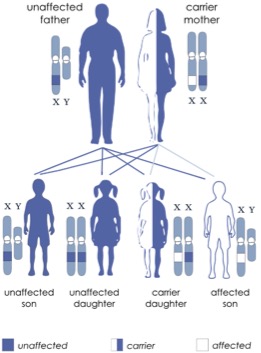Duchenne muscular dystrophy
Causes
DMD is a genetic condition. The cause5 is a mistake or mutation in the genetic code (DNA). In DMD, the mutation occurs in the dystrophin gene, located on the X chromosome.
Girls have two X chromosomes and boys only one. Boys inherit one X chromosome from their mother and one Y chromosome from their father.
DMD usually affects only boys, as they do not have a second X chromosome to compensate for the faulty gene. In rare cases girls, are also affected (1:1 000 000).

A little over half of all individuals with DMD inherit the condition from their mother. These mothers are 'carriers'. They are not usually affected by the mutation, so they are not aware that they can pass the condition to their sons. Even when the mother is a carrier, there is often no history of DMD in the family.
If the mother is a carrier, each son has a 50% chance of inheriting the X-chromosome with the mutation in the dystrophin gene. If they inherit the mutation, they will have DMD. Each of her daughters has a 50% chance of inheriting the mutation and being a carrier.
In approximately one-third of cases, the fault in the dystrophin gene is not passed from mother to son. It appears in the child for the first time without any family history of DMD and is a 'de-novo' mutation.
If the mother is not a carrier, she has a much lower risk of having another child affected by DMD. The risk is still higher than the general population due to “germline mosaicism”. This means that a test may be negative as some of her oocytes carry the fault in the dystrophin gene and others do not.
Women with an affected son who are not carriers have a 5-10% higher than average risk of a second child with DMD.
A man with DMD cannot pass the condition to his sons as each son will inherit the Y chromosome from his father. Each daughter of a man with DMD will be a carrier of DMD as she inherits the X chromosome from her father.
The three main alterations that can occur in the dystrophin gene leading to a DMD diagnosis are:
- Deletions: the most common alteration. They cause sections of the dystrophin gene to be missing.
- Duplications: copied sections of the dystrophin gene result in an altered dystrophin gene.
- Nonsense mutations: the instructions for making dystrophin are shorter than normal. This leads to the production of incomplete dystrophin.